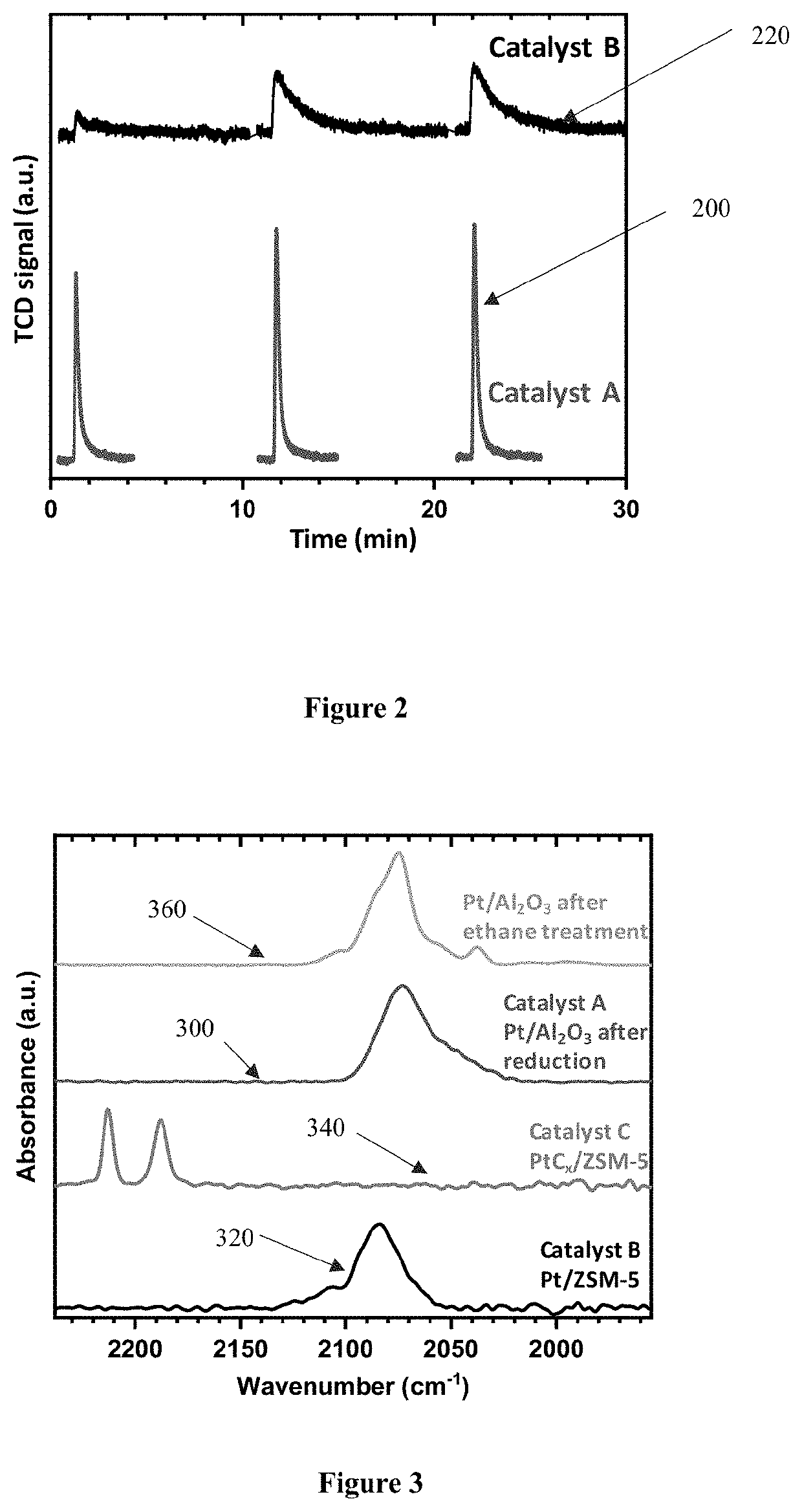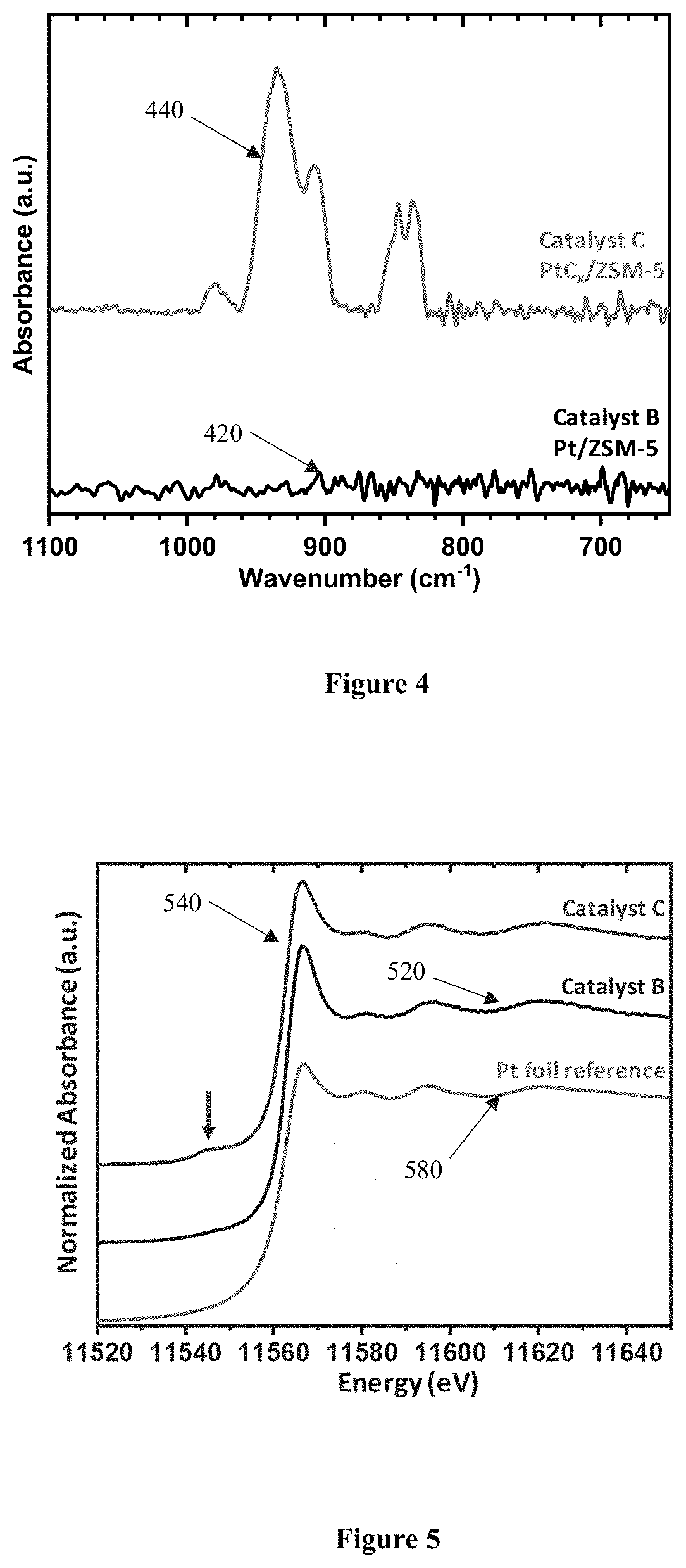Hydrocarbon conversion processes using metal carbide nanomaterial catalysts
a technology of metal carbide nanomaterials and catalysts, which is applied in the direction of physical/chemical process catalysts, bulk chemical production, calcination, etc., can solve the problems of low olefin selectivity, low activity, and low yield of pt carbide materials, etc., to achieve low cost and high activity , the effect of negligible green oil productivity
- Summary
- Abstract
- Description
- Claims
- Application Information
AI Technical Summary
Benefits of technology
Problems solved by technology
Method used
Image
Examples
example 1
[0052]5 g of ZSM-5 powder (having a silica to alumina ratio of 30) was mixed with a certain amount of Pt(NO3)2 in solution. The mixture was agitated at room temperature for 1 hour and then heated to 80° C. in a rotary evaporator to obtain a dry product, which was followed by air calcination at 550° C. for 4 hours. The powder was then in-situ reduced in hydrogen at 630° C. for 1 hour, and cooled down to room temperature (e.g., between 20-25° C.) in a hydrogen atmosphere. The powder was then pressed and sized to 20×40 mesh. The obtained product is denoted as catalyst B, which contains 500 ppm Pt. Catalyst B was then subjected to characterization measurements to determine its features.
example 2
[0053]A powder was prepared using the same procedure for Catalyst B from Example 1, but after the reduction in the hydrogen atmosphere, the powder was cooled to 400° C. in a hydrogen atmosphere, followed by a an inert gas purge at 400° C. for 10 minutes and then activated in ethane (50% balance in nitrogen) at a temperature between 300-500° C. After the ethane activation, the powder was cooled down to 100° C. under ethane flow, and further cooled to room temperature in an inert gas atmosphere, e.g., in nitrogen. The obtained product is denoted as catalyst C, which also contains 500 ppm platinum.
[0054]Catalysts A, B, and C were then characterized by testing and analyzing the catalysts for the platinum dispersion in the catalyst by dynamic CO chemisorption measurements (chemical adsorption), where the evolution of the platinum species was also studied by diffuse reflectance infrared Fourier transform spectroscopy (DRIFTS), and X-ray absorption near edge structure (XANES). As will be d...
PUM
| Property | Measurement | Unit |
|---|---|---|
| Temperature | aaaaa | aaaaa |
| Temperature | aaaaa | aaaaa |
| Temperature | aaaaa | aaaaa |
Abstract
Description
Claims
Application Information
 Login to View More
Login to View More - R&D
- Intellectual Property
- Life Sciences
- Materials
- Tech Scout
- Unparalleled Data Quality
- Higher Quality Content
- 60% Fewer Hallucinations
Browse by: Latest US Patents, China's latest patents, Technical Efficacy Thesaurus, Application Domain, Technology Topic, Popular Technical Reports.
© 2025 PatSnap. All rights reserved.Legal|Privacy policy|Modern Slavery Act Transparency Statement|Sitemap|About US| Contact US: help@patsnap.com



